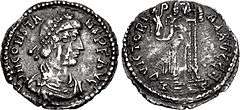Constans II (usurper)
| Constans II | |||||
|---|---|---|---|---|---|
| Co-emperor or Usurper of the Western Roman Empire | |||||
|
Siliqua of Constans II | |||||
| Reign |
407–409 (Caesar under Constantine III) 409–411 (Augustus with Constantine III, against Honorius) | ||||
| Died |
c. 18 September 411 Vienne, Viennensis | ||||
| |||||
| Father | Constantine III | ||||
| Religion | Nicene Christianity | ||||
Constans II[1] was the eldest son of the Western Roman Emperor Constantine III and was appointed co-emperor by him from 409 to 411. He was killed during the revolts and fighting that ended his father’s reign.
Career
Elder son of Claudius Constantine and brother of Julian,[1] in his youth Constans was a monk.[2] In the summer of 408, his father, who had proclaimed himself Emperor the previous year in Britain[3] and then crossed over into Gaul, proclaimed him Caesar,[4] and sent him with the general Gerontius and the prefect Apollinaris into Hispania, to rule the province and fight members of the House of Theodosius (four cousins of Honorius – Theodosiolus, Lagodius, Didimus and Verenianus) who had not recognised Constantine and had stayed loyal to the Emperor.[5] After some initial defeats, Constans captured two of his enemies (Didymus and Theodosiolus), while the other two fled to Constantinople.[6] He left his wife and household at Zaragoza under the care of Gerontius to return to report to Arles, where the two prisoners were put to death .[7]
In Autumn 409, barbarian invaders plundered Gaul, reached the Pyrenees, swept away Roman defences and entered into Hispania.[8] Constantine, without the approval of the Emperor Honorius, elevated Constans to the rank of Augustus;[2] Constans was to go to Hispania to settle the matter, but before leaving news came that Gerontius had stopped the invaders, had rebelled from Constantine, and had proclaimed Emperor one of his own men, Maximus of Hispania.[7] With the support of the barbarians, Gerontius took over Constantine's territory; in 411, he captured the city of Vienne and put Constans to death.[9]
Whether Constans II was a usurper is open to debate: he was crowned after Constantine III had been recognised as co-emperor by Honorius. However, this recognition would not have included the right to extend the imperial power to Constantine's family.
Legend
British legend, aided by Geoffrey of Monmouth, states that Constans was elected by the Britons as king after Constantine's death. This contradicts the known history of Constans, as does the remainder of his British story. The legend claims Constans, older brother to Aurelius Ambrosius and Uther Pendragon,[10] spent his early life studying at a monastery. During the succession crisis following Constantine's murder, Vortigern, leader of the Gewissei tribe, convinced Constans to leave the religious life and become king.[11] The weak and unpopular former monk became a puppet, putting all but the title of his office into the hands of Vortigern.[12] Vortigern eventually disposed of him by tricking some Picts, liaisons in his employ, into murdering him in his sleep.[13] The treacherous Vortigern took the throne for himself.[14]
Sources
Primary sources
- Zosimus, Historia Nova, Book 6 Historia Nova
- Orosius, Historiae adversum Paganos, 7.40
Secondary sources
- Birley, Anthony (2005), The Roman Government in Britain, Oxford University Press, ISBN 978-0-19-925237-4
- Jones, Arnold Hugh Martin, John Robert Martindale, John Morris, The Prosopography of the Later Roman Empire, volume 2, Cambridge University Press, 1992, ISBN 0-521-20159-4
- 3 Elton, Hugh, "Constans III (409-411 A.D.)", D.I.R.
- Canduci, Alexander (2010), Triumph & Tragedy: The Rise and Fall of Rome's Immortal Emperors, Pier 9, ISBN 978-1-74196-598-8
- Bury, J. B., A History of the Later Roman Empire from Arcadius to Irene, Vol. I (1889)
- Gibbon, Edward, Decline and Fall of the Roman Empire (1888)
References
- 1 2 Jones, pg. 310
- 1 2 Canduci, pg. 153
- ↑ Jones, pg. 316
- ↑ Birley, pg. 459
- ↑ Bury, pg. 140
- ↑ Gibbon, Ch. 30
- 1 2 Elton, Constans II (409-411 A.D.)
- ↑ Elton, Constantine III (407-411 A.D.)
- ↑ Birley, pg. 460
- ↑ Monmouth, Historia Regum Britanniae, 6:5
- ↑ Monmouth, Historia Regum Britanniae, 6:6
- ↑ Monmouth, Historia Regum Britanniae, 6:7
- ↑ Monmouth, Historia Regum Britanniae, 6:9
- ↑ Monmouth, Historia Regum Britanniae, 6:10
| Legendary titles | ||
|---|---|---|
| Preceded by Constantine II |
King of Britain with Vortigern |
Succeeded by Vortigern |
